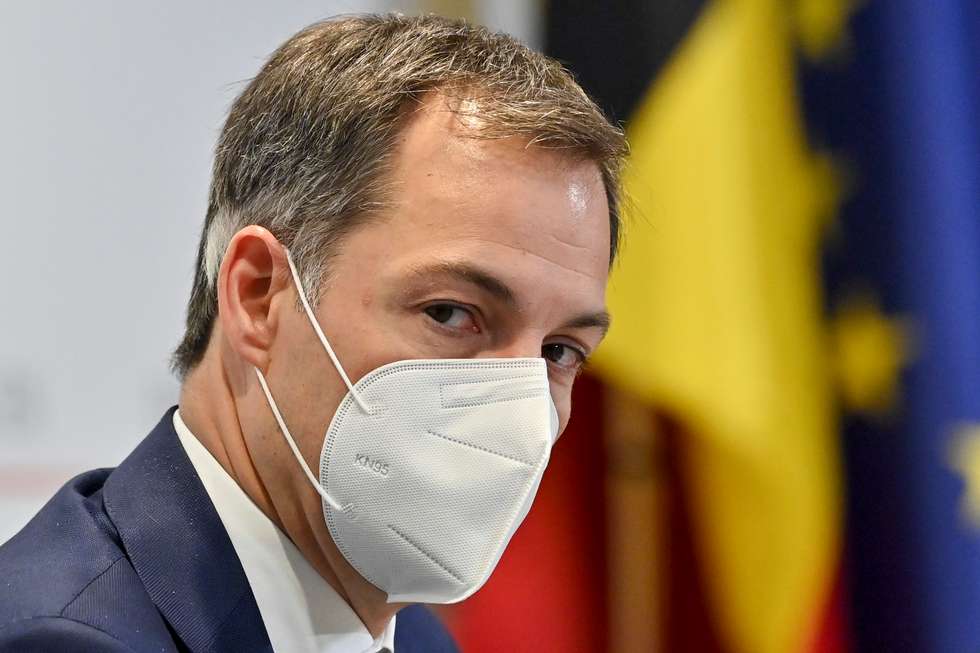Three days before Christmas, Belgium is introducing new measures to slow the rapid spread of the coronavirus and the Omicron variant, announced Prime Minister Alexander De Croo during a press conference on Wednesday.
"In our country, we have had a stable package of measures intended to combat the Delta wave for three weeks now and we can see that these measures are helping: the number of infections is falling," De Croo said.
"But despite these figures, it is clear that there is cause for concern: what we already know about the Omicron variant is not good news," he added. "Experts estimate that this variant will also become dominant here in our country very soon. One thing is certain: we have to be more careful than ever before."
"We are monitoring the situation from day to day. Some countries already have more Omicron infections, so we are keeping a close eye on them," De Croo said. "If necessary, we will also take stricter measures. But only if necessary."
"Today, there is nothing more important than getting that booster shot. I myself received mine today," he added. "Especially at a critical time like now, in the middle of winter. That is why we decided to confirm existing measures and take a number of new preventive ones."
Preventive measures
From Sunday 26 December, all indoor activities (apart from those within a household) will be prohibited, even if the audience is seated: cinemas, theatres and concert halls have to close.
Libraries, museums and sports activities will still be allowed. Regular swimming pools can also remain open, but subtropical ones (such as waterparks) must close.
Flemish Minister-President Jan Jambon, who is also Flanders' Culture Minister, regretted the successive blows to the cultural sector in the past two years. "The support measures and the dialogue with the sector will continue. We want to help the organisations through this crisis."
All outdoor events held in a tent – including Christmas markets and winter villages, cultural and other performances and congresses – will no longer be allowed. Additionally, for events with over 100 visitors, a one-way traffic plan with separate entrances and exits is required.
Shopping will only be allowed in pairs, with an exception for minors. Shops can only allow one customer per 10 square metres at a time.
Professional and amateur sports games – such as football matches and cyclo-cross – will no longer be open to the public, either indoors or outdoors.
The current teleworking rules remain unchanged: working from home remains mandatory four days per week. The measures for the hospitality industry and for non-medical contact professions have not been changed either.
'Hoped for a different Christmas'
"The aim is to keep the pressure on the healthcare system manageable and ensure that schools can open on 10 January," De Croo stressed.
He added that he understands that these measures are painful for everyone. "After a year of efforts, we had all hoped for a different Christmas."
However, De Croo pointed to the difference with the situation last year. "A year ago, bars and shops were closed. Hairdressers were closed. We could hardly even see each other. Those things will be possible this year. But I cannot stress this enough. Please, take the necessary precautions: limit the number of guests, do a self-test, and ventilate as much as possible."
De Croo said that the pandemic is not only a health crisis but also an economic and a humanitarian one.
"That is why it is so important that we have seen a lot of solidarity, it has pulled us through. The year is ending more difficult than we had hoped this summer, but I am convinced that we will get through it. I wish you good end-of-year festivities, but please celebrate in a safe way."
'We are not going to a lockdown'
"Fortunately, there are things we are reasonably sure of. Namely that the measures we have taken are doing their job," said Federal Health Minister Health Frank Vandenbroucke. "But we are also faced with a new uncertainty. We know that Omicron is highly infectious but we do not know what the impact is on hospitals and hospitalisation."
"By itself, a big infection wave is already a problem: people cannot go to work, general practitioners are overwhelmed... And so you have to be on the safe side."
"For me, it has rarely been so hard to have to take new measures. We know how incredibly important it is for an artist to be on stage. We are now making that impossible again, and hope it will not last long," Vandenbroucke said.
"We are not going to a lockdown. We are taking these measures precisely because we do not want a lockdown. We want the schools to open again, that is our goal."
Vandenbroucke also underlined that people with a low income can still get a self-test for €1 at the pharmacy. "Those self-tests are very useful to know whether you might be infected after all, so make use of them. They are the last check just before you get together with your family."
A new meeting of the Consultative Committee to evaluate the situation will take place in the first week of January.

